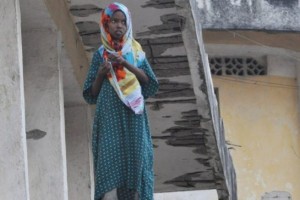Project aims at rebuilding war-torn nation’s rich literary history one story at a time.
By: Michelle Shephard
 It is hard to imagine the faded yellow building, where a few families eke out an existence, was once Somalia’s National Library.
It is hard to imagine the faded yellow building, where a few families eke out an existence, was once Somalia’s National Library.
Mogadishu’s ruins blend one building to the next, so there is little to distinguish it from the bombed-out remains of nearby parliament buildings.
But that may soon change if all goes to an ambitious plan to restore Mogadishu’s library — the latest project in the capital’s construction boom.
“There are so many youth who do not have a safe place to go and read; they may not have lights at their houses and they need somewhere to learn,” the project’s director, Zainab Hassan said Thursday from Mogadishu. “It is one of the most important things that can make a difference in society.”
Hassan is working with the Heritage Institute for Policy Studies, Mogadishu’s first think tank, to restore the building and hoping to tap Somalia’s business community and diaspora for funds, along with private investors.
They already have the backing of U.S. Democratic Congressman Keith Ellison, who visited Mogadishu in February and recently shipped 22,000 books from the U.S. Ellison represents Minnesota, home to the U.S.’s largest Somali diaspora and where Hassan lived before retuning to Mogadishu this spring.
A six-page proposal for the library project outlines the goals for the four-storey building that crumbled along with the rest of the city when Somalia’s government collapsed in 1991. Three floors will be divided by language — Somali, Arabic and English — and carry fiction and non-fiction books, journals, text books and DVDs.
Abdirashid Hashi, Heritage Institute’s deputy director and a former Toronto resident, said the project has widespread support in Mogadishu — often difficult to achieve — and the building will remain government property, with the restoration privately financed.
Hashi says they are working with government officials to find homes for the families who have settled in the building or erected tents outside. Many areas of Mogadishu remain unofficial camps and shelters for those displaced by the 2011 famine, or years of fighting with the Al Qaeda-aligned, Al Shabab.
He also plans to meet with students and community leaders in Toronto next month to ask for help. “Somali-Canadians are always supportive of doing things on the home front,” he said Thursday.
Somalia is still a long way from becoming a wired nation with a generation reading only online.
“Most people don’t have Internet in their house and those that do, it’s almost impossible to do searches or download anything because it’s jammed or so slow,” said Hassan.
And while Somalia has a history as a story-telling nation, elders say it once boasted a rich literary scene.
“Notwithstanding that Somalis are famously an oral society, there was an established culture of reading, research and inquiry in most urban areas,” reads the project outline.
Source: The Star


